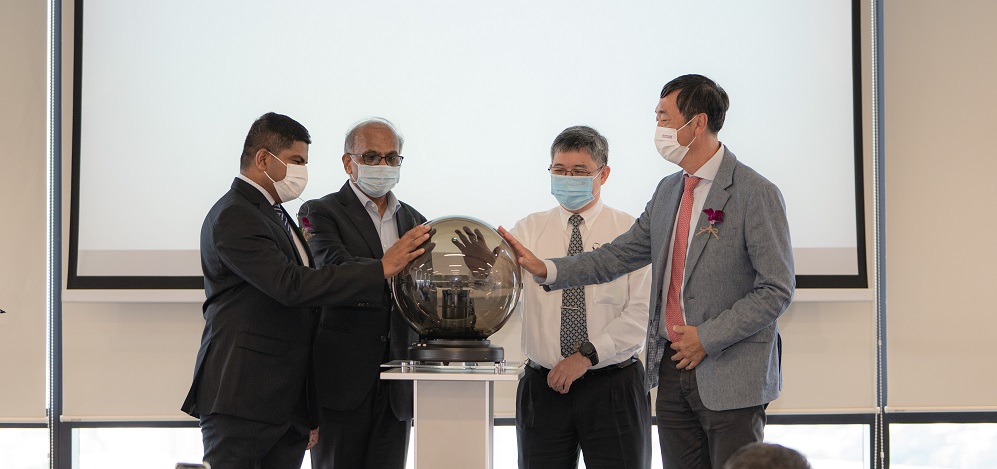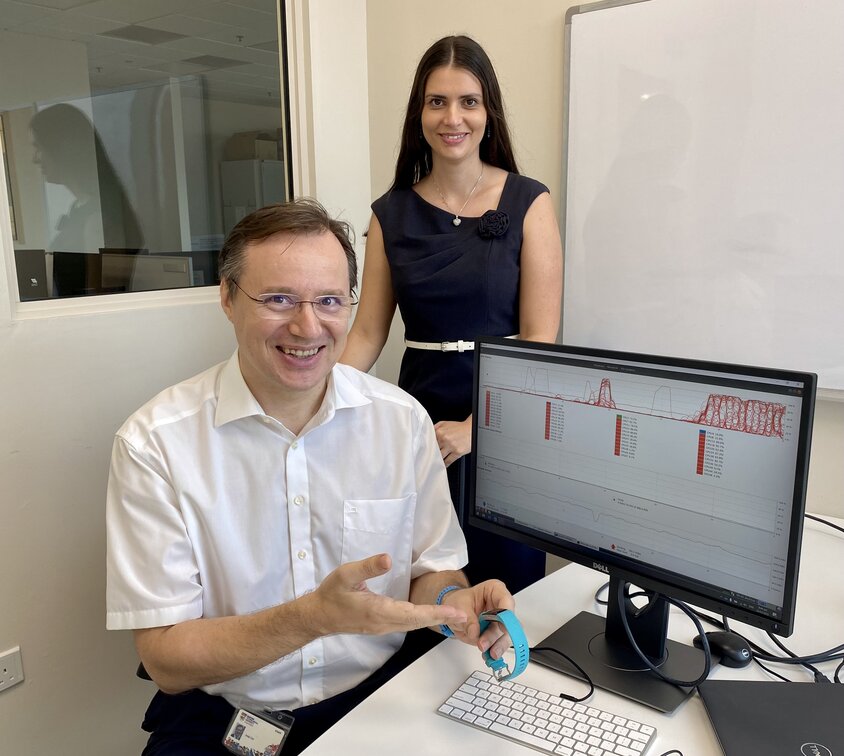The AI will see you now: diagnosing mental disorders intelligently
NTU scientists leverage the power of artificial intelligence to diagnose mental conditions.
From dementia to schizophrenia, mental health disorders affect individuals at every stage of life. According to the World Health Organisation, one in eight people around the world lives with a mental disorder and poor mental health costs the global economy USD $1 trillion in lost productivity annually.
Like many diseases, effective treatment for mental health disorders hinges on early and accurate diagnosis. However, unlike, for example, a heart attack that can be diagnosed through tests that detect specific indicators or ‘biomarkers’ associated with the condition, no biomarkers for mental health conditions have been clearly identified to date.
This is because mental illnesses are the result of a complex interplay of factors, including genetics, biological predisposition and adverse life situations. Patients with the same mental disorder present with widely differing symptoms, making it challenging to identify whether any specific indicators are associated with a particular mental illness.
Furthermore, physicians have to assess the symptoms reported by patients themselves, which are then open to subjective interpretation.
Enter artificial intelligence into the mental health specialist’s diagnostic toolkit. The ability to process and draw insights from large datasets efficiently means that artificial intelligence (AI) has the potential to discover the biomarkers of mental illnesses hiding among complex profiles of genetic markers and behavioural clues.
The technology might also predict if a mental impairment in a patient is likely to become more severe and help to suggest personalised treatments tailored to each patient’s condition.
Sussing out schizophrenia

Co-Directors of the Centre for Biomedical Informatics Asst Prof Bernett Lee and Asst Prof Wilson Goh. Credit: Lee Kong Chian School of Medicine, NTU Singapore.
Typically beginning in young adulthood, schizophrenia can be defined as a severe mental disorder in which patients lose contact with reality. Symptoms of the condition include bizarre behaviour and hallucinations, also known as psychosis. Although a combination of genetic and environmental factors is believed to cause schizophrenia, its exact cause is unknown.
Leveraging the potential of AI and data science to help predict mental health conditions is one of the focus of Nanyang Technological University, Singapore’s (NTU Singapore) newly launched Centre for Biomedical Informatics. Among the centre’s projects is the New Zealand-Singapore Data Science Research Programme, a collaboration between NTU Singapore, the Institute of Mental Health (IMH) in Singapore and Auckland University of Technology (AUT) to help predict schizophrenia in youth.
Co-led by bioinformatics scientist Asst Prof Wilson Goh of NTU Singapore’s Lee Kong Chian School of Medicine, the programme is developing machine-learning computational models that identify biomarkers associated with the onset of schizophrenia symptoms.
The joint research team is using an AI algorithm developed by AUT to analyse the gene expression and metabolic profiles in blood samples collected from 600 young people, and then comparing the findings with clinical and behavioural data from the participants.
Putting all this together into a single model, the scientists hope to see how they relate to one another.
“AI programmes that analyse large datasets have made it possible for us to spot relationships between gene expression and metabolic data. Looking at more dimensions in the data may enable physicians to identify early indicators of schizophrenia and treat the disorder before the patient’s quality of life deteriorates,” said Asst Prof Goh.
Decoding dementia

The newly launched Dementia Research Centre (Singapore) aims to decode dementia in Asians to predict and delay progression of the disease. Credit: NTU Singapore.
In contrast to schizophrenia, dementia is a brain disorder that afflicts mainly the elderly. Patients with advanced dementia experience memory loss, poor judgement and confusion, which impairs daily living.
Addressing the increasing cases of dementia in ageing populations in Asia and around the world, the Dementia Research Centre (Singapore) at NTU Singapore is developing AI-powered strategies to predict and delay progression of the disease.
Working with local hospitals to recruit 1,500 patients from all ethnicities with mild cognitive impairment – the earliest stage of dementia – one of the projects at the centre is the Biomarker and Cognitive Impairment Study (BioCIS), a five-year study to understand what happens to the brain at the early stages.
BioCIS plans to identify biomarkers associated with cognitive impairment by studying features of brain structures from brain scans, measuring brain activity using functional magnetic resonance imaging (fMRI) and detecting protein biomarkers in the blood.
“This will help us develop personalised strategies which could potentially prevent and delay the development of dementia in each patient,” said Director of the Dementia Research Centre and senior consultant neurologist Assoc Prof Nagaendran Kandiah of NTU Singapore’s Lee Kong Chian School of Medicine.
“For example, we can formulate interventions to improve a patient’s weak cognitive areas as well as enhance their strengths to delay the progression of dementia.”
Detecting depression

Prof Josip Car and Dr Iva Bojic, senior research fellow, one of the researchers who developed the Ycogni programme for detecting depression. Credit: NTU Singapore.
Another innovation from NTU Singapore is the development of a non-invasive AI tool that may aid in the early detection of depression, a common mood disorder that can occur at any age.
Depression affects millions around the world, and may be triggered by stressful life events. Individuals with the condition often experience mood changes that cause them to withdraw from society, and almost half of depression cases remain undiagnosed and untreated.
Harnessing the growing popularity of wearable activity trackers, the NTU Singapore team has developed AI software that analyses data from fitness trackers to uncover digital biomarkers of depression and predict an individual’s risk of developing it.
To develop their machine-learning programme, called Ycogni, the scientists, led by clinician-scientist Prof Josip Car of NTU Singapore’s Lee Kong Chian School of Medicine and cognitive neuroscientist Assoc Prof Georgios Christopoulos of NTU Singapore’s Nanyang Business School conducted a study involving 290 working adults in Singapore. Participants wore fitness trackers for two weeks and completed two health surveys, which screened for depressive symptoms, at the start and end of the study.
From the data, the researchers associated certain patterns in the participants’ fitness tracking behaviours to depressive symptoms, such as feelings of helplessness and hopelessness, a loss of interest in daily activities, and changes in appetite or weight.
In tests on data from depressed and healthy participants, the programme could successfully detect those individuals with a high risk of depression and those with no risk, to an accuracy of 80 per cent.
The findings, published in JMIR mHealth and uHealth in October 2021, open new ways for AI to assist in the diagnosis of depression.
Plans to validate the algorithm further are in the pipeline.
“The advantage of using AI in combination with wearable technologies to monitor wellbeing is that it is an unobtrusive way to identify individuals at risk of mental illness, enabling these conditions to be diagnosed and treated early,” said Prof Car.
“We believe that Ycogni could be integrated with Smart Buildings or Smart Cities initiatives to help individuals, researchers, mental health practitioners and policy makers improve mental well-being,” said Assoc Prof Christopoulos.


-and-dr-dorrain-low-from-ntu-singapore's-lkcmedicine.tmb-listing.jpg?Culture=en&sfvrsn=b389b500_1)
.tmb-listing.jpg?Culture=en&sfvrsn=82921582_1)


.tmb-listing.jpg?Culture=en&sfvrsn=ba129532_1)
